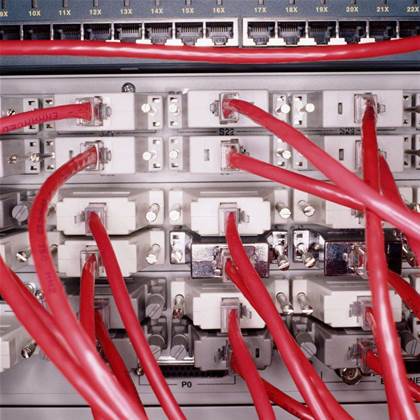The Australian Competition and Consumer Commission (ACCC) has handed internet service providers reselling ADSL services over Telstra infrastructure heavily discounted wholesale fees under a one-year interim determination.

The determination, which sets standard pricing for Telstra's wholesale DSL service for the first time, comes ahead of a final five-year declaration to be determined later this year.
Such a declaration could resolve numerous concerns from ISPs over allegedly monopolistic behaviour by Telstra over the past decade.
The interim determination - and eventual five-year declaration - term will allow the ACCC to determine the prices charged by Telstra for access to its DSLAM equipment in exchanges where an ISP had not deployed its own infrastructure.
The watchdog said it decided to declare the service as, "despite the deployment of competitive infrastructure in some geographic areas over the past decade, on a national basis, competition for the supply of wholesale ADSL services is not effective".
The price changes are likely to affect ISPs providing or hoping to provide ADSL services to consumers in the approximately 2200 ADSL-enabled exchanges where Telstra is the only infrastructure provider.
The ACCC estimated Telstra's monopoly on infrastructure had prevented competitive access to approximately 11 percent of Australian premises.
Setting prices
Under the interim access determination[pdf] issued alongside the declaration notice and set to expire in February next year, service providers will be able to purchase DSL ports on Telstra infrastructure for $25.40 a month in "zone 1" or metropolitan areas, and $30.80 a month in "zone 2 and 3" outer-metropolitan and regional areas.
Telstra will be be required to supply its aggregated virtual circuit - the backhaul tail required to provide some services to regional areas - at $45.50 a megabit a month until the end of June this year.
From July 1, this rate would need to be reduced to $33.65 a megabit a month.
The year-long declaration, a potential blow to Telstra's wholesale cost construct, provides a marked discount on the flat-rate charges [pdf] the telco last year revealed it planned to charge internet service providers in its structural separation undertaking to the ACCC.
It submitted plans to charge $31 a month per port for metropolitan DSL services and $38 a month for regional services, as well as a $65 aggregated virtual circuit charge.
At the time, telco executives told iTnews the flat-rate charges could provide cheaper services to smaller ISPs but would be a blow to bigger providers who had negotiated volume discounts with Telstra.
Welcomed by ISPs
A Telstra spokesman said the company was "disappointed by the ACCC’s decision".
"Telstra does not believe that market conditions justify increased regulation of Telstra’s copper network at this time," he said.
"Telstra is assessing the implications of this decision for our business."
Telco executives told iTnews that while the zone 1 pricing set by the ACCC would not make much difference to the larger players in the industry, outer metro and regional pricing would likely provide relief for most service providers.
"The improvement in Zone 2/3 and on AGVC costs is good news," Internode carrier relations manager John Lindsay said.
"This is likely to result in more competitive service offerings in rural and regional areas."
iiNet chief regulatory officer Steve Dalby said the declaration was "positive" on first look.
"Clearly the ACCC has found that the price squeeze behaviour by Telstra was unacceptable and has finally taken steps to regulate this service," he said.
Lindsay warned, however, that the watchdog's decision not to make a declaration on the requirement to bundle a PSTN voice service with the wholesale DSL product would likely provide some room for Telstra to "wriggle around on the charges".
Interim rules
The interim declaration, applied from Wednesday this week, will stay in place until a final determination on pricing is made.
The ACCC assured it had built in a "protected retail margin" between Telstra's retail
and wholesale charges.
It determined the interim determination would "generally place access seekers on an equivalent footing with each other in terms of prices paid for the Service... hence the [interim determination] is likely to promote competition between access seekers".
According to data published within the declaration notice, ADSL competition rapidly drops off in those areas where Telstra is the sole infrastructure provider.
In the regional band 3 area, Telstra currently has 95 percent market share where the most rural portion of its ADSL footprint sees only 0.5 percent market share for competitors.
The wholesale DSL declaration precedes a final decision by the watchdog on Telstra's structural separation undertaking later this month.



_(33).jpg&h=140&w=231&c=1&s=0)

_(20).jpg&h=140&w=231&c=1&s=0)





 Cyber Resilience Summit
Cyber Resilience Summit
 iTnews Executive Retreat - Security Leaders Edition
iTnews Executive Retreat - Security Leaders Edition
 Huntress + Eftsure Virtual Event -Fighting A New Frontier of Cyber-Fraud: How Leaders Can Work Together
Huntress + Eftsure Virtual Event -Fighting A New Frontier of Cyber-Fraud: How Leaders Can Work Together
 iTnews Cloud Covered Breakfast Summit
iTnews Cloud Covered Breakfast Summit
 Melbourne Cloud & Datacenter Convention 2026
Melbourne Cloud & Datacenter Convention 2026












_(1).jpg&h=140&w=231&c=1&s=0)



